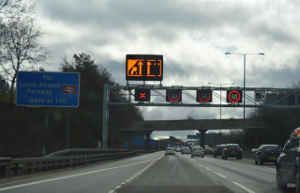The Smart Motorway X Factor: Drivers Ignoring Signs

According to new data, more than 53,000 private and motor trade drivers across the UK have ignored the Red X signs on intelligent motorways since 2021.
These electronic signs indicate a lane is closed, and drivers should avoid using it. Instead, motorists are directed to use the remaining open lanes, often at a reduced speed, to ensure safety.
Motorway Red X signs are typically activated in response to accidents and road obstructions or to create a clear path for emergency services to reach an incident faster. However, many drivers still fail to follow the rules, leading to enforcement actions.
Thousands of Motorists Caught Breaking The Rule.
Analysis by road safety charity IAM RoadSmart revealed that in 2021, nine police forces caught over 4,000 drivers violating the Red X rule. This number surged in 2022, with nearly 21,000 motorists caught on camera by 11 different forces.
The trend continued to rise, with over 28,000 drivers penalised in 2023, as police forces increased enforcement, impacting insurance policy renewal prices and no-claims bonuses.
IAM RoadSmart shared that nearly all police forces covering areas with smart motorways are actively pursuing drivers who disregard these important safety measures. Ignoring a Red X can result in a fixed penalty notice, carrying a fine of up to £100 and three points on a driver’s licence.
In more serious cases, harsher penalties may be imposed. In all cases, you will need to notify your local insurance broker or company.
Experts Advise Motorists to Pay Attention.
Nicholas Lyes, IAM RoadSmart Director of Policy and Standards, said: “Ignoring a Red X sign on a smart motorway is dangerous because it risks a serious collision and for this reason, we welcome police forces clamping down on those who break the law.
If a lane is closed on a smart motorway, it usually indicates a stranded vehicle ahead, people working on the road, or a collision. If you see a Red X sign, you should slow down and move into an open lane when there is sufficient space to do so.“

A RAC road safety spokesperson said: “These figures sadly underline the fragility of one of the systems designed to keep stricken drivers safe on smart motorways. The safety of any driver who is unlucky enough to stop on a smart motorway depends entirely on other people seeing the red-X sign and moving to another lane.”
“It’s therefore terrifying to think that so many people have either ignored or failed to spot them in the first place.”
“The latter is all the more likely given the fact that on all-lane-running stretches of motorway, where the hard shoulder has been removed completely, it’s largely roadside signs that communicate which lanes are closed, which are more challenging for drivers to read than gantries that span the carriageway and have signs over each lane.”
“It’s for this, and other reasons, that we’ve called on the new Government to convert all-lane running stretches of smart motorway to either controlled motorways – with hard shoulders permanently restored – or to dynamic hard shoulder schemes, where a hard shoulder is in place for much of the day and night, and only opened to traffic at the busiest times of the day.”
Red X signs are critical for ensuring safety on smart motorways. With more police forces actively enforcing the rules, drivers are urged to stay alert and follow the signs to help prevent accidents and keep the roads safe for everyone.







